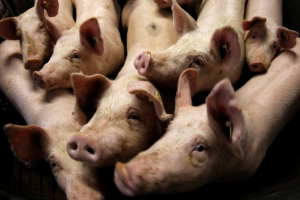Australia: First piggery to earn carbon credits

Parliamentary Secretary for Climate Change and Energy Efficiency, The Hon Mark Dreyfus QC MP, launched Blantyre Farms as Australia’s first carbon farming piggery.
The launch took place 25 October. Blantyre Farms is the first piggery in Australia to be given the green light to earn carbon credits from destroying methane generated by pig manure – making it the first farm-based project declared eligible under the Federal Government’s Carbon Farming Initiative (CFI).
Located near Young in NSW, Blantyre Farms has approximately 22,000 pigs, and was the first piggery in Australia to install a commercial-scale system to generate power from methane from an anaerobic (covered pond) system.
The piggery converts methane from pig manure into electricity, powering the entire operation of the farms. The technology and machinery were built by Australian company, Quantum Power.
Although the farm can generate CFI credits and renewable energy certificates from the project, the main benefit is that owners, Edwina and Michael Beveridge, no longer pay $15,000 a month for electricity and gas, but earn $5,000 a month from the power it sells back to the grid.
The declaration of eligibility means Blantyre Farms can create credits for emissions abatement achieved since commissioning of the project in March of this year.
The Australian pork industry was the first industry to have a methodology endorsed and approved by the Domestic Offsets Committee (DOIC) for CFI in Australia. The industry developed the methodology in conjunction with the Department of Climate Change and Energy Efficiency (DCCEE) and a technical working group made of industry experts.
The methodology is titled ‘Destruction of methane generated from manure in piggeries’ and involves collecting the gas generated from piggery manure through covering open lagoons, and destroying the methane by flaring or generating electricity.
Mr Dreyfus and the Beveridge family will be joined by Andrew Spencer, CEO of Australian Pork Limited (APL) and Richard Brimblecombe, CEO of Quantum Power, on 25 October at Blantyre Farms, in Young NSW.
APL coordinates a strong environmental research and extension program based on producer priorities and an Environmental strategy that identified managing Greenhouse Gases (GHG) and renewable energy as key priorities for the industry. Although only contributing 0.4 per cent of Australia’s GHG emissions the industry identified a significant opportunity to reduce its emissions by approx 70 per cent across the supply chain by capturing and destroying or utilising the methane produced from the effluent ponds on farms.
Having researched European and Northern American systems that weren’t suited or economically viable for the Australian Industry, APL identified a transferable low cost system based on NZ research, which has a similar industry and needs to Australia’s. The system suited to smaller as well as larger piggeries opened up the technology to a wider part of the Australian Industry.
APL initiated the development of a Biogas Group with interested producers who are leading the way with information sharing, developing feasibilities, implementation and identification of barriers. Their feasibilities have identified a range of systems and uses including heat generation, offsetting electricity use from the grid and replacement of LPG and diesel sources. A couple of projects have now been completed, and a number are at various stages of completion. From this initial group another 5 feasibilities have been completed by the Pork CRC and APL have a long list of interested producers.
APL are supporting the biogas program by funding various biogas research projects, coordinating the biogas group, disseminating information and working with the Pork CRC who have a Bioenergy Support Program run out of the University of Queensland that provides support and information for Pork producers.
Source: Australian Pork Limited







